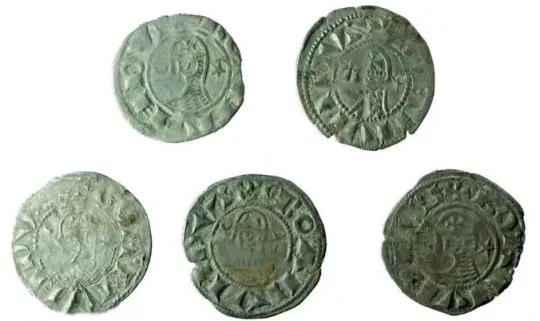In a tale that reads like a plot twist from a historical thriller, a metal detectorist's quest for glory takes a dark turn as he resorts to planting his own coins to fabricate a remarkable discovery. Michael Jones, eager for recognition and fame, orchestrated an elaborate ruse by purchasing rare silver deniers on eBay and strategically burying them in a field, only to feign astonishment at his supposed find during a metal detecting rally in Titley, Herefordshire.
The audacious scheme, however, quickly unraveled as suspicions arose among Jones's fellow detectorists, who found it peculiar that such valuable treasures had surfaced in an area devoid of similar artifacts. Archaeologists, too, were poised to rewrite history, noting the significance of the coins potentially being linked to the Knights Templar—an unprecedented revelation that could have altered our understanding of the Herefordshire region and the Welsh borders.
Yet, behind the facade of archaeological breakthroughs lay a web of deceit and deception. Peter Reavill, the finds liaison officer for the county, underscored the rarity and importance of the coins, emphasizing the far-reaching implications of their discovery. However, it was not long before the truth came to light, as a vigilant detectorist uncovered identical coins sold on eBay, casting doubt on Jones's purported find.
Upon investigation, authorities uncovered the damning evidence: the coins Jones claimed to have unearthed bore an uncanny resemblance to those he had purchased online. Confronted with irrefutable proof of his deception, Jones admitted to his wrongdoing, confessing to his desire for fame and bravado. His actions, he lamented, were driven by a moment of folly—a misguided attempt to elevate his status in the metal detecting community.
During the trial, testimonies painted a picture of calculated deceit and premeditated deception. Adrian Harris, a fellow detectorist, recounted the suspicious circumstances surrounding the discovery, noting Jones's lack of surprise upon uncovering the coins. The revelation sent shockwaves through the metal detecting community, prompting reflection on the ethics and integrity of the hobby.
Jones bought the rare Crusader coins on eBay (Picture: Leon McGowran)
In the end, Jones was acquitted of fraud by false representation, with the court citing insufficient evidence of financial gain. While justice may have been served in the eyes of the law, the incident serves as a cautionary tale—a sobering reminder of the pitfalls of unchecked ambition and the importance of upholding integrity in the pursuit of knowledge and recognition. As the dust settles on this extraordinary saga, the world of metal detecting grapples with the repercussions of one man's quest for glory.








